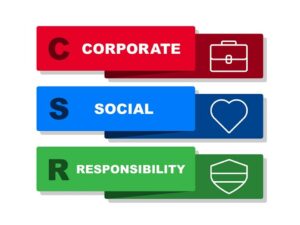The following is a speech that I presented in Beijing, at the Future 500 China conference in 2004. I kept the text as I used it then. Some concepts have since changed meaning, such as “corporate social responsibility”, which today I would personally call “creating shared value”. But in 2004 I meant exactly the same.
It seems very strange to state that an economic system that has created so much wealth in our western societies could be called ‘a success that failed’.
My opinion is in fact that it is destructive to the human health, human spirit and the ecosystem that supports our life.
The presently dominant ideas about what a successfull economy means, how it is defined, how a successfull business concept should be defined, originates in the USA and – unfortunately – has taken ground in the past 15 years or so in many boardrooms of European companies. At its heart, at its very core, the dominant USA business concept focusses solely on maximizing profits for the sake of the shareholders. Its success is a myth, even a lie. It has put a high price on the development of societies and resulted in the degradation of ecosystems by using a very limited definition of “creating added value”.
There is an alternative for this american way of doing business. It is called “the Corporate Social Responsibility approach to business”, also called the “Triple P approach” (‘P’ stands for ‘people, planet and profit’). Fortunately, many American business leaders have discovered this concept, but it is especially in Europe and in other important economies of the world, that this business concept has aroused a lot of interest.
Its key premise is that a business organization creates added value for a broad spectrum of stakeholders, of which only one is the capital market (i.e. shareholders). Its objective is to meet the needs of present and future stakeholders, thereby exceeding legal requirements, by integrating the economic, social and environmental dimensions into the business strategy and operations. This business approach prepares an organization in a sound way to compete in the ever more complex and evolving global economy, because it creates value for a spectrum of stakeholders that it relates to, being:
- its own people, its employees;
- its customers;
- its suppliers;
- the community;
- the capital markets; and
- the ecosystem in which it operates and on which it depends.
The key question to be answered is:
Is the “Corporate Social Responsibility business approach” successful, is it competitive? Is this an alternative for the presently dominant USA business concept of focussing solely on the maximization of shareholder value?
My answer to that question is definitely affirmative, I even believe that in the long term this approach will be more successful than the presently dominant US concept. I acknowledge the fact that academic research over time still has to provide the hard scientific data supporting the early anecdotal evidence.
But at this point in time it can be stated that the CSR approach to business is – from a profitability point of view – at least not inferior to the conventional approach of ‘maximizing shareholder value’ as the sole purpose of business.
This in itself is already a remarkable observation.
We should also clearly acknowledge this:
“The CSR approach is no panacea for weak, spineless leadership and ineffective, unprofessional operational implementation, but it explicitly has to be stated: neither is the “maximizing shareholder value approach”.
So there is an alternative for the American way of doing business, “the Corporate Social Responsibility approach to business”.
Now I wish to share with you the following, more specific characterizations of the values created for the different stakeholders:
- own people, employees
Socially Responsible companies see their members as human beings (holistic view), rather than as ‘human resources’ (mechanic, instrumental view):
- SR companies are focused on:
- developing and releasing its members’ full potential
- on the individual level,
- teambased and
- organizational level;
- involving them, empowering them; and
- creating a culture of trust and mutual respect.
- developing and releasing its members’ full potential
- SR companies encourage their people to challenge the status quo, to innovate, to serve all stakeholders in even better ways than they expect.
- The vision and mission – “raison d’être” – of SR companies aligns with those of its members (who – after all – are also citizens and parents) creating pride of, commitment for, loyalty to the organization; one might say: love for, or dedication to the work they are doing.
- SR companies are characterised by flexibility; they are not only reacting to, but are also co-creators of their business-, social and ecological environment.
- SR companies have a strong position (brand reputation) on the labour market, being able to attract the “best and brightest”.
By creating superior value for their employees, SR companies build professional, creative, innovative and flexible – in other words – competitive organizations.
2. Customers
SR companies both satisfy and surprise their customers by:
- Providing safe, healthy products (services).
- Permanently enhancing quality, offering “excellent value for money” in terms of:
- performance (function),
- durability,
- repairability,
- ecofriendliness (biodegradable, recyclable).
- Creating totally new products in the context of the challenges of a sustainable development.
By creating superior value for their customers, SR companies create stable, loyal sources of income and a solid brand image – in other words – a competitive market position.
3. Suppliers
SR companies regard their suppliers as “long-term partners in business”:
- Quality enhancement, product cost reduction, new product development are integrated in these relationships – working together based on shared values (economic, social and environmental) and trust;
- This saves overhead-cost, transaction costs, reduces “time to market” and increases the chances of market success;
- They are “learning together”, thereby constantly enhancing their mutual competitive strengths:
- product innovation (see also ‘B. customer’),
- reduced product cost,
- increased process efficiency,
- increased organizational effectiveness (see also ‘A. own people, employees’),
- stronger company reputation (see also ‘D. community’ & ‘E. capital markets’).
By creating a superior quality of relationship with their suppliers, SR companies create trustful, innovative and professional partnerships in business that lead to increased competitive strengths for both.
4. The Community
SR companies create value on three “levels of community”:
- Local level
- SR companies contribute to the strengthening of the “social fabric” of the communities in which they operate;
- a positive economic impact;
- creation of meaningful jobs (see also ‘A. own people, employees);
- no pollution; and
- respect for (natural) resources.
- National level
- SR companies contribute to the effectiveness and
- the reduction of the costs of public governance by proactively addressing environmental and social issues;
- they are partners in the strategic transition process towards a renewed/redefined sustainable economic system.
- International level
- transfer and exchange (this is a two-way process) of “know why” & “know how” (values, technology, governance, business management); SR companies set ambitious rules and benchmarking standards for responsible trading, production and business practises;
- they help creating totally new business models e.g. public-private partnerships (often also with social entrepreneurs and Non-Governmental-Organisations) to deliver products/services for markets in both areas of market failure and the developing economies.
By creating superior value for the communities in which they operate, SR companies remain competitive by gaining a strong ‘license to operate and license to evolve’.
5. Capital Markets
SR companies are attractive for the capital markets, the financial community, because of:
- Their enhanced competitive strengths.
- strong market profile/reputation,
- excellent product performance (see also ‘B. customers’),
- optimal organizational effectiveness (see also ‘A. own people, employees’ and ‘C. suppliers’),
- powerful “license to operate” (see also ‘D. communities’).
- The quality of their leadership and management.
- value driven leadership with a view for the whole system their business is operating in,
- strategic investment approach: balancing long-term and short-term objectives,
- innovative attitude.
- The long-term profitability .
- see all previous content,
- strong marketposition & -development,
- strong brandimage/reputation,
- costeffectiveness,
- reduced risks & liabilities.
Strong, value-driven leadership and professional execution of the CSR approach to business lead to sound profits, satisfying the financial community in general and the own shareholders in particular – in other words – an improved competitive position in accessing capital.
6.Ecosystems
SR companies are environmentally friendly, because:
- They use a Life Cycle Assessment approach to the ecological dimension of the business process impact of the whole value chain in which they operate
- holistic, systems view on unsustainable in- and output flows;
- closed loop approach.
- They strive toward “zero pollution” concerning
- toxic emissions,
- greenhouse gases (especially CO2),
- waste (biodegradability, recyclability).
- They strive for sustainable resource use concerning
- a move from non-renewables e.g. energy (fossil fuels) to renewables e.g. solar and wind,
- all other precious resources (raw materials, land, water, space, silence, etc.).
- They respect the “intrinsic web of life”
- biodiversity and
- the interdependent relationships within an ecosystem and its cyclic nature.
By acknowledging and operating within the constraints of ecosystems in which they operate, SR companies create innovative products, a positive brandimage, reduced environmental liability, and therefore a stronger, more competitive market position in evolving and new markets.
Conclusion
The Corporate Social Responsibility business approach is not easy to implement. Besides strong, value-driven leadership it demands ‘out-of-the-box-thinking’, an open and receptive mind and attitude, integrity, unconventional creativity and the involvement of all main stakeholders. It requires professional in- and external process-management, and persistence.
But the results will reap rich rewards for European businesses. Basically they are the following:
- new sources of sales and profit;
- reduced – if not zero – risks of environmental and social liabilities;
- a stronger reputation in the capital markets, as a result of better market positioning, profit projections and proven strategic leadership within the value chain;
- increased customer loyalty: an improved product offering which answers real functional and qualitative demands;
- a stronger, highly motivated organization with a real sense of purpose, which second nature has become to innovate, and to implement decisively and successfully;
- a preferred position on the labour market where top-talent is attracted by a company- culture that takes the challenges of sustainable development serious, acts accordingly and aligns individual (personal), societal and company values;
- a solid, creative and mutually profitable relationship with suppliers;
- a powerful ‘license to operate and to grow’ in an increasingly more critical and well-educated society.
There are not enough entrepreneurs yet that have the vision, courage and entrepreneurial spirit to take the necessary strategic steps towards sustainable business development: creating social, environmental and economic wealth simultaneously.
But their numbers are increasing. And a new business mood for the 21st century has definitely been set. It is a great challenge and transition, in which the role of the European Union will be to set the market frameworks that facilitate this shift towards a globally competive, socially responsible and environmentally sound economy.




